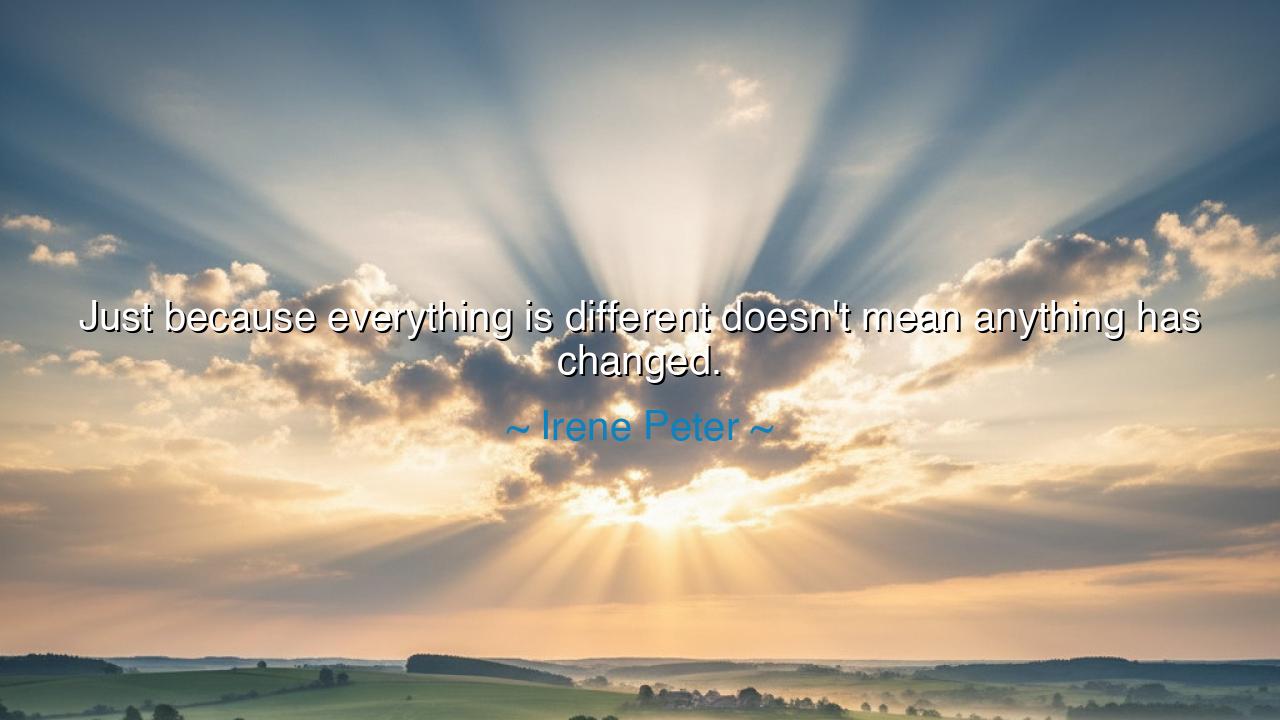
Just because everything is different doesn't mean anything has






Opening Scene
The room is softly lit by the warm glow of a table lamp, casting long, gentle shadows across the walls. Outside, the world begins to quiet as the evening sets in. Jack sits at the table, absently flipping through a book, while Jeeny stands by the window, looking out into the still city below. There’s a certain quiet in the room, as though they are both reflecting on something deeper.
Host: After a few moments of silence, Jeeny turns, her voice steady but thoughtful, breaking the stillness.
Jeeny: “I came across a quote by Irene Peter that really made me think. She said, ‘Just because everything is different doesn’t mean anything has changed.’ It’s such a simple yet profound thought. It made me reflect on how we often mistake surface-level changes for real transformation. What do you think about that idea — how we sometimes confuse change in appearance for actual change in substance?”
Jack: “That’s such a great point. It’s easy to look at the world around us and think that just because things look different, everything has changed. But change isn’t always about what’s visible on the surface; it’s about what’s happening underneath. It’s like when people update their external appearance or adjust their habits, but if they don’t change the core of who they are, nothing really shifts. Change requires a deeper shift, not just a cosmetic one.”
Jeeny: “Exactly. It’s almost like we’re so focused on outward transformations that we forget about the internal work that’s required. The world can look completely different — new technology, new ways of doing things, new trends — but if we don’t change the way we think, feel, or act, all those surface changes don’t really amount to much. It’s like we’re stuck in a cycle of change without any real growth.”
Jack: “Right. And I think that’s where the real challenge lies. We get caught up in the excitement of newness, in the idea that because things look different, they must be better. But real change comes when we challenge ourselves to evolve, to dig deeper into what needs to shift in our attitudes, our habits, and our values. It’s easy to get distracted by the external stuff, but it’s the internal work that leads to true transformation.”
Host: The conversation deepens, as the weight of Irene Peter’s words resonate between them. Jack sets his book aside, his expression thoughtful, while Jeeny sits down across from him, her voice steady as she continues.
Jeeny: “It’s interesting because this idea applies to society as well. Think about how much we hear about change — new policies, new trends, new movements. But if those things aren’t aligned with deeper values or don’t address the root causes of the issues, then they’re just surface-level changes. It’s easy to think that new things will solve old problems, but unless there’s a real shift in how we approach the underlying issues, we’ll continue to face the same challenges.”
Jack: “That’s such a good point. Change that’s only skin-deep doesn’t have the power to solve anything. Real change requires reflection and action on a deeper level. It’s like when someone makes a small adjustment in their life or work but doesn’t address the bigger, underlying patterns. If they don’t change their mindset or the way they approach problems, they’ll end up facing the same obstacles over and over again, just in a slightly different form.”
Jeeny: “Exactly. And I think this is where we have to be honest with ourselves. It’s easy to convince ourselves that because we’ve made a change in how things appear, we’ve truly transformed. But it’s the internal, sometimes uncomfortable work — the hard conversations, the self-reflection, the willingness to confront difficult truths — that actually creates lasting change.”
Jack: “Right. It’s about being open to the discomfort of growth, and recognizing that real transformation isn’t always immediately obvious. It’s not the flashy, attention-grabbing changes that matter most. It’s the quiet, internal shifts that happen over time, the small steps we take to improve who we are and how we relate to the world around us.”
Host: The room feels quieter now, as if the weight of their thoughts has settled in. Outside, the world continues, but inside, Jack and Jeeny share a deeper understanding: change is not just about appearances; it’s about the deeper, often less visible shifts that truly make a difference. Surface-level changes may seem significant, but they don’t bring real transformation unless they’re accompanied by internal growth and evolution.
Jeeny: “So, maybe the lesson here is that we have to be careful not to confuse appearance with substance. Just because things seem different doesn’t always mean they’ve truly changed. The real change happens when we address the deeper layers — the things that aren’t as obvious, but that shape everything.”
Jack: “Exactly. It’s easy to get swept up in the excitement of the new, but true change comes when we look beyond the surface and focus on what needs to shift at the core. That’s where growth and real transformation come from.”
Host: As the evening continues, the conversation wraps up with a quiet understanding. Change is not always as it seems. While the external world may shift and evolve, true transformation requires a deeper shift in mindset, attitude, and action. It’s the internal work, often hidden from view, that creates lasting change — the kind that truly transforms lives and societies.






AAdministratorAdministrator
Welcome, honored guests. Please leave a comment, we will respond soon